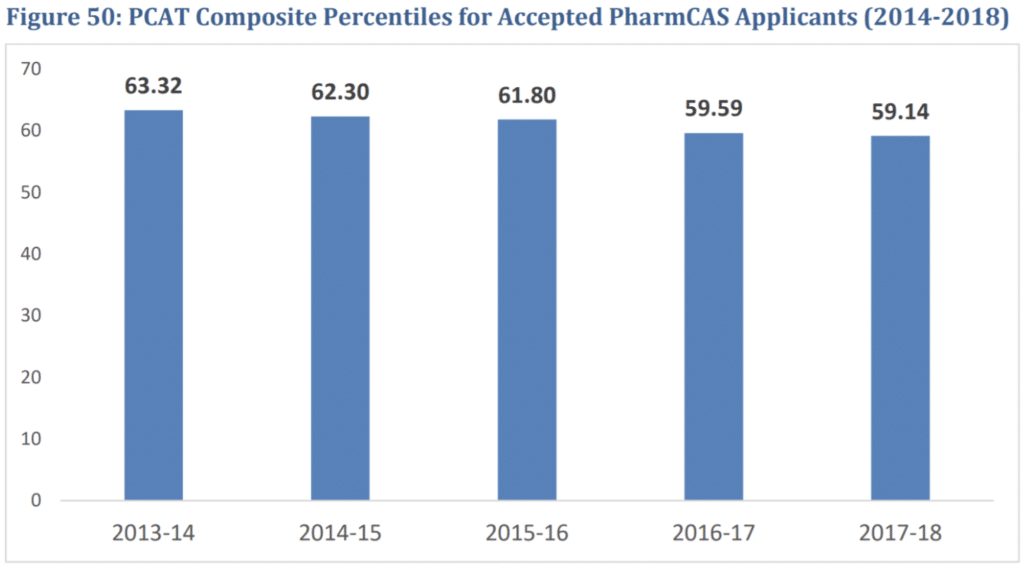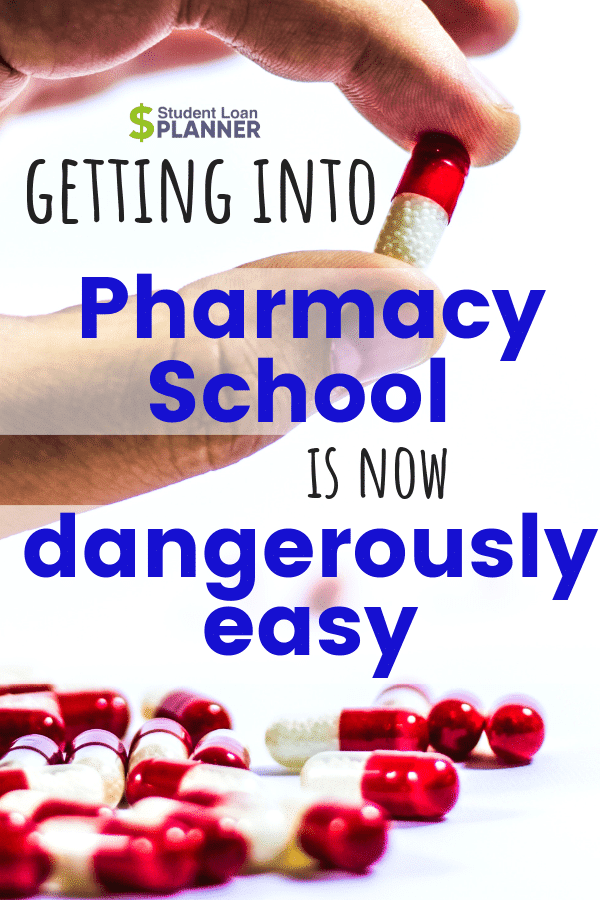When you were in high school, did you get “strongly encouraged” by your mom or dad to seek a high paying, stable career? My dad was relentless in trying to get my two brothers and me to go to medical school, to become eye doctors or pharmacists. So is going to pharmacy school a good idea in 2023?
Let's get one statistic out of the way: using the most recent available PharmCAS data from the 2021-2022 school year, the acceptance rate for pharmacy school was 87%, down slightly from the record 89% acceptance rate from the year before. It's getting to the point where pharmacy schools will take almost anyone who applies. We look at the long term dynamics for the profession if you're already a pharmacist, and we'll look at what it means if you're considering applying to pharmacy school.
The Cost of Pharmacy School Isn't Slowing Applications as Much as You'd Think
According to the 2022 AACP Graduating Student Survey, the average pharmacist student debt at graduation was $170,444, down slightly from 2021.
As a student loan consultant, I admittedly see the higher end of the debt loads in every profession. In fact, our average pharmacist client has a student debt of $228,000. In other words, pharmacy programs aren't cheap.
That said, I’m hearing stories that should give anyone going to pharmacy school or about to fill out a pharmacy school application pause.
If you’re already a pharmacist with a bunch of student debt after years of college, we can definitely help you get a plan to tackle it. If you owe less than 1.5 times your salary and you work in the private sector, you might just refinance your pharmacy school loans and pay them off.
Neither one of those paths are ideal though. Refinancing to a 10-year (or longer) term or needing a specialized student loan consultant should not be necessary.
It's only happening because forces in the profession care more about their own profit and narrow interests. You can feel free to sound off in the comments about your feelings on that.
If pharmacy stakeholders don't change something soon, they could kill their golden goose. I want to shed light on the misconception that many in the public and health science profession still have that a pharmacy degree program leads to a sure-fire career with a high income and job security. When 5% of the profession signs a petition to #ChangePharmacy, you know you're close to a breaking point.
The Acceptance Rate of Pharmacy School Has Soared Over Time
For any figures in this article, assume that I got the data from the American Association of Colleges of Pharmacy (AACP). I also have to tell you that they don’t bear any responsibility for the interpretations or conclusions I make, which are my own.
If you look at the report from the Pharmacy College Admission System (PharmCAS), you’ll see startling trends developing in medicine and the pharmacy world. While applications are falling, the acceptance rate continues to climb, reaching a record 89% for the 2020-2021 school year.
| Year | Pharmacy schools | Applicants | Accepted | % of accepted applicants |
|---|---|---|---|---|
| 2003-2004 | 43 | 13,722 | 4,683 | 34% |
| 2004-2005 | 43 | 14,433 | 4,570 | 32% |
| 2005-2006 | 45 | 14,650 | 4,932 | 34% |
| 2006-2007 | 47 | 14,869 | 5,448 | 37% |
| 2007-2008 | 59 | 15,908 | 6,581 | 41% |
| 2008-2009 | 72 | 16,246 | 8,168 | 50% |
| 2009-2010 | 86 | 17,220 | 9,447 | 55% |
| 2010-2011 | 96 | 17,451 | 10,429 | 60% |
| 2011-2012 | 103 | 17,405 | 10,804 | 62% |
| 2012-2013 | 110 | 17,617 | 12,247 | 70% |
| 2013-2014 | 116 | 17,225 | 12,438 | 72% |
| 2014-2015 | 119 | 16,858 | 13,086 | 78% |
| 2015-2016 | 124 | 16,369 | 13,015 | 80% |
| 2016-2017 | 126 | 16,204 | 13,185 | 81% |
| 2017-2018 | 129 | 15,886 | 13,139 | 83% |
| 2018-2019 | 133 | 15,335 | 12,708 | 83% |
| 2019-2020 | 135 | 13,998 | 12,143 | 87% |
| 2020-2021 | 134 | 13,006 | 11,520 | 89% |
| 2021-2022 | 134 | 11,219 | 9,700 | 87% |
In 2004, the acceptance rate for pharmacy school was about 32%. In 2021, the acceptance rate for pharmacy school is 89%.
In other words, pharmacy school has gone from a highly competitive profession to one where almost anyone can get in. Basically, if you take the prerequisites and pass undergrad science coursework with a decent minimum GPA, it's possible to get in somewhere.
How grad plus loans caused pharmacy schools to open everywhere
In 2006, Congress created the Grad PLUS loan program. Under this new type of loan, a student could borrow an unlimited sum to go to a graduate program, up to the cost of attendance.
Suddenly, students had guaranteed access to unlimited federal funds, with only the stated cost of attendance as a barrier.
Universities figured this out, so many of them opened a new school of pharmacy. In my view, they used the GAO report from 2000 and high average salaries as a rationale.
Notice that the number of pharmacy schools and accepted applicants basically tripled over less than 15 years.
Pharmacy School Metrics Keep Getting Worse
Look at this data from the AACP on the average PCAT scores from 2014-2018.

Accepted PharmCAS applicants GPA
Here is the data for GPA from 2003 to 2022. You’ll notice that the grades for admitted students, in general, have fallen over the same time frame that so many schools opened.
Overall undergrad GPA for admitted students fell to a low of 3.28 in 2019-2020 and slightly recovered to 3.32 for 2020-2021. While applicant qualifications might have leveled off, they are far below levels from the early 2000s.
| Year | Science GPA | Math GPA | Total undergrad GPA |
|---|---|---|---|
| 2003-2004 | 3.34 | 3.26 | 3.43 |
| 2004-2005 | 3.37 | 3.31 | 3.47 |
| 2005-2006 | 3.39 | 3.44 | 3.48 |
| 2006-2007 | 3.40 | 3.45 | 3.49 |
| 2007-2008 | 3.35 | 3.40 | 3.45 |
| 2008-2009 | 3.30 | 3.37 | 3.42 |
| 2009-2010 | 3.29 | 3.37 | 3.41 |
| 2010-2011 | 3.29 | 3.61 | 3.40 |
| 2011-2012 | 3.27 | 3.35 | 3.40 |
| 2012-2013 | 3.25 | 3.33 | 3.38 |
| 2013-2014 | 3.23 | 3.31 | 3.36 |
| 2014-2015 | 3.21 | 3.28 | 3.34 |
| 2015-2016 | 3.18 | 3.26 | 3.32 |
| 2016-2017 | 3.16 | 3.24 | 3.31 |
| 2017-2018 | 3.15 | 3.24 | 3.30 |
| 2018-2019 | 3.15 | 3.22 | 3.30 |
| 2019-2020 | 3.12 | 3.20 | 3.28 |
| 2020-2021 | 3.17 | 3.22 | 3.32 |
| 2021-2022 | 3.21 | 3.25 | 3.35 |
To be clear, getting into certain pharmacy schools is still difficult. For example, getting into law school is now tremendously easy compared to the past, as schools fight overqualified candidates. However, it will always be challenging to get into Harvard Law.
In the same light, the best programs for a pharmacy student will always have to turn away good candidates. They’re just not turning away nearly as many as they used to.
The higher cost schools in pharmacy tend to be the easiest pharmacy schools to get into. After all, the schools have big profit margins and lots of incentives to push becoming a pharmacist as a dream career.
Pharmacists face limited job growth with the influx of new grads
The growth rate of jobs for pharmacists is expected to be 2% from 2021 to 2031, which is less than the average for all occupations, 5%, according to the BLS.
The growth in the number of admitted students over the past 15 years was 7.1%.
Those numbers just don't match up.
The need for pharmacists didn’t expand as fast as the government predicted.
Before the pandemic, the pharmacist job market was in moderate distress, with employers such as Kroger laying off all new hires in 2018 after a short amount of time, as well as in 2019.
Clients pre-pandemic told me that they were having trouble getting full-time hours in many cases.
The pandemic paused many of those trends, but we expect them to return once we return to more normal economic times.
Pharmacy resident programs are a source of cheap labor
Were pharmacy residency programs created because there was an acute lack of knowledge? My belief is that when there was a tighter job market, many pharmacists could learn on the job while earning a high income.
Now, many hospitals and other employers use residents as a source of cheap labor. There are plenty of ways that you can save on your student loans during a pharmacy residency, including signing up for Pay As You Earn (PAYE) or Saving on a Valuable Education (SAVE), formerly REPAYE, to build credit towards loan forgiveness. You can even cut your interest rate if you are eligible for subsidies.
Employers can hire two or three residents for what they pay one full salary pharmacist. Hence, I’d expect average residency length will continue to grow and more career paths will require advanced training after pharmacy school.
We've seen “degree and credential creep” in other fields such as Physical Therapy. You used to be able to practice as a physical therapist with a master's degree, until the accrediting body for the profession started requiring a doctorate, with no commensurate change in pay.
Residency programs are a natural outgrowth of an oversupply of pharmacists. Hence, long term, we expect the growth of residency programs will continue.
How did getting into pharmacy school go from hard to easy?
My dad would tell me stories as a high school kid about how someone’s daughter at church was going to make $120,000 a year working four days a week as a pharmacist. He was a teacher making about $50,000, so that sounded like a fantastic lifestyle.
I think the combination of a culture that values high-paying stable jobs with unlimited loan money combined with old-fashioned greed on the part of universities, in relation to tuition costs, got us to this point in the pharmacy profession.
The host of the Pharmacy Leaders Podcast posted these admissions process statistics first on Facebook, where I got the idea for this article.
One experienced pharmacist commented on the thread,
“When I graduated in 2001, the running joke was if you have a license and a pulse, pharmacies throw money at you to hire you. Now it should be “Do you have a pulse and an approved loan application? We'll take you!”
How pharmacists have it better than some occupations
If you could work 20 hours a week as a pharmacist and earn $60,000 or 40 hours a week while bringing work home and make $50,000, which career would you choose? My teacher father would probably have said “pharmacist” as his preference.
The reality of student loan math is that many pharmacists working in the healthcare field cannot pay their student loans back easily with the earnings from their degree.
However, if your income isn’t where you want it to be relative to your debt, you can utilize the student loan forgiveness options available to reduce the cost of your loans in real dollar terms.
If you owe more than two times your household income in student loan debt, you probably need to implement a forgiveness strategy with PAYE or SAVE over 20 to 25 years. If you work at a not-for-profit hospital, you need to get set up with Public Service Loan Forgiveness (PSLF).
If you have a good debt-to-income ratio in a private sector job in the pharm field, you might consider refinancing pharmacy school loans.
Some pharmacists are still making lots of money and doing well, just fewer than we’d like
Even though the pipeline of new grads leaving campus has flooded the job market with pharmacists, there are still plenty of people with a PharmD degree who are making lots of money, paying down their debt rapidly and doing very well for their families.
Some have been able to boost earnings from the pandemic labor shortage.
If that’s you, I applaud your effort and hard work. The problem is that the dynamics of the profession don’t guarantee that hard work in a PharmD program will be rewarded financially as it did back in the day.
You might need to move where the jobs are. Rural parts of the country still need pharmacists to work in pharmacy practices a lot more than suburban Tampa or Northern Virginia. Many of our highest earning clients live in places like Appalachia, the Midwest or the rural South.
If you keep a full-time job in a highly competitive job market, my suggestion is to have a high savings rate and prepare your finances for anything.
If we have another recession like in 2008 and there's still no reform on student loan rules, I expect even more people will go to pharmacy school or other professional programs.
Incomes will gradually be eroded until fewer pharmacists decide to work for the pay that’s offered or fewer students decide to go to pharmacy school. I would expect inflation level increases at best for pharmacy salaries as a whole.

How to be financially secure as a pharmacist in 2022
If you’re not already in pharmacy school, hopefully, these stats paint a realistic picture that getting into pharmacy school is now easier than ever. Schools and their admissions committee will be fighting over you if you have good scores.
You should also be skeptical of what admissions offices tell you. They’re locked into a brutal battle, in many cases, to justify their existence.
Many pharmacists want fewer pharmacy schools after all. I’d expect there to be dozens of school closures if anything happened to restrict the flow of federal student debt.
If you’re already a PharmD or working towards one with several academic years under your belt, we’d love to help you make a plan for your pharmacy school debt. The profession is not all doom and gloom. Many of our clients set aside five and even six figures a year in savings as a family, while efficiently tackling their debt.
One of my friends worked in a community hospital and was using the wrong repayment plan and strategy (He should have been utilizing the PSLF program.) His projected savings were over $200,000 after working with us.
More typical findings include filing taxes the wrong way, paying too little on loans that need to be paid off or overpaying on loans that will be forgiven.
Regardless of your path, we’d love to offer more insight and make a student loan plan for your pharmacy school debt. If you want to read more, check out every post we've written for pharmacists struggling with six figure debt.
What do you think these admissions statistics mean for the future of the pharmacy profession? Comment below and share your thoughts.

Comments are closed.